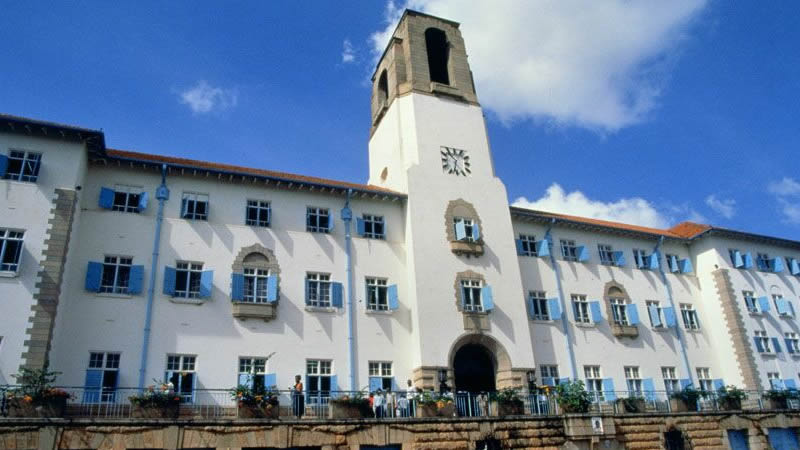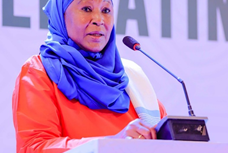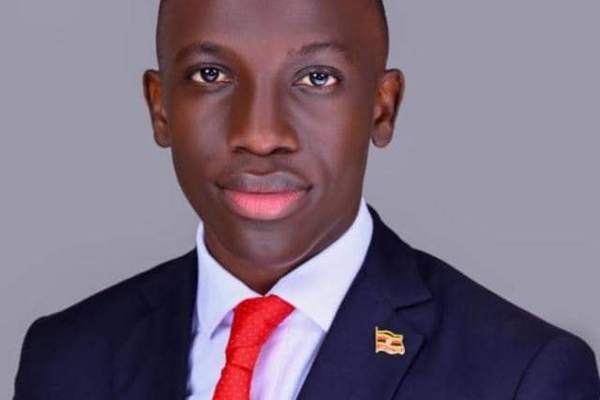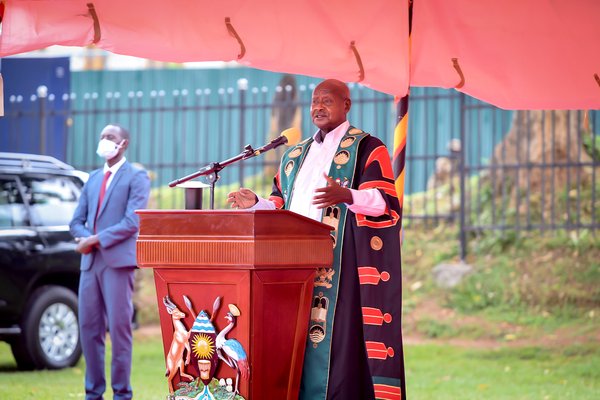By Claire Balungi
Like heroes, great institutions have their demons. For many a student, getting through a semester at Makerere can be a struggle as they stake their tuition or living allowance on unguaranteed gains. This has led to the worrying emergence of betting within the esteemed walls of the institution, jeopardising the prospects of bright minds. Once an occasional indulgence, betting, a destructive habit, has staggered into Makerere’s halls of residence onto students’ television screens and mobile phones.
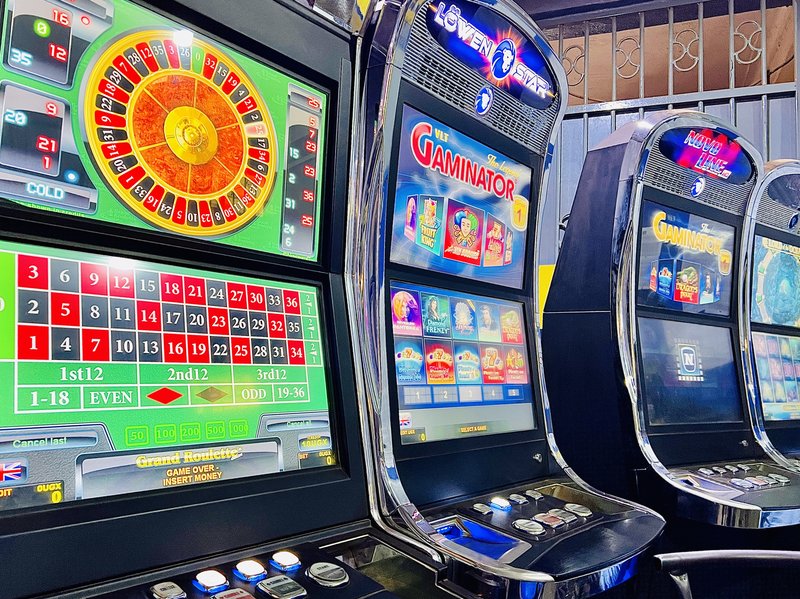
Slot machines at a betting house
The Makerere of the 80s and 90s was however different, in fact sophisticated.
“Betting was unknown to us. We looked at it as an immoral thing. Sudhir Ruparelia appraised it in the form of Lottery around the late 90s. The headquarters was near Wandegeya. He came with Scratch and the Dama game, if I recall correctly, but even then, going to university was a real landmark and any form of gambling was taboo to us. Many stuck to their odd jobs for extra cash,” recalls Eng Charles Mwanja who was a student of Makerere from 1982-1986.
That was then. Now, many students are not afraid to gamble their education away, always hoping to find more even as they keep losing each shilling they are lucky to get, to betting.
A huge problem
The problem is significant and cannot be ignored, not with the numbers involved. The Daily Monitor on March 13, 2024, stated in a headline that, “1000 students drop out of Makerere annually over sports betting - Nawangwe”.
Near Makerere, around Wandegeya, legally accredited betting houses have found a home. This is where both locals and students place stakes, commonly known as okusiba akapapula (tying the paper), as Ephraim Bukenya, a former student and resident of Nkrumah Hall calls it. The kapapula (paper) is the receipt given to one when they stake. “The more chances one takes by staking on games, the longer the receipt will be and the more money they are likely to win,” explains Bukenya. “One other popular betting game is the dog race. Running dogs are watched on a screen and the participants bet on which dog will finish first,” shares Elvis Lubanga, a masters student at Makerere. The industry also has brokers who think they have mastered the betting system; these often tempt others to take chances and turn pocket change into a cleaner stash, understood by the locals as okwozaamu ssente (washing out money).
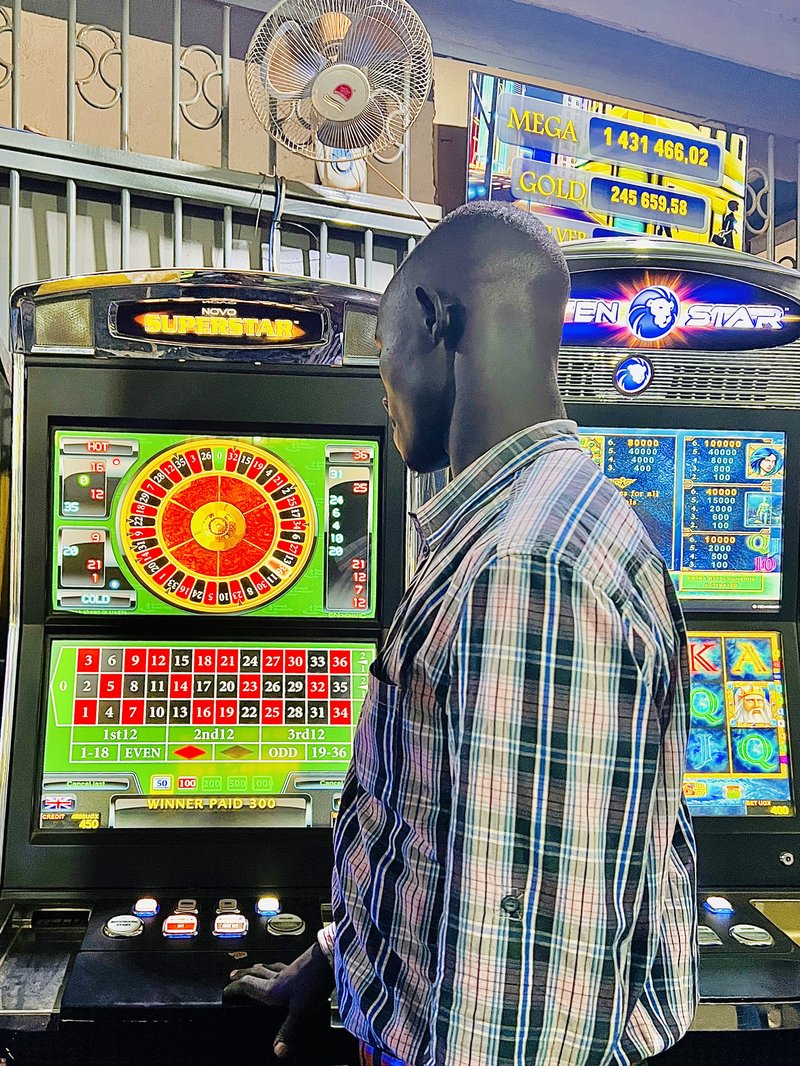
A gamestar operating a slot machine
The betting industry has also gone digital. Betting apps can now be downloaded in the comfort of student halls and hostel rooms. And so a student getting their wallet lighter just got a whole lot faster.
“There was a scenario where we almost lost a life of a student who had staked some of his tuition, Shs 500k on football and won Shs 3 million from the many sports stakes he had put. He was sleeping when the roommate came and stole the ticket, and it can be paid out regardless of who takes the ticket to the payment spot. The betting house gave him money. When the initial owner came looking for his receipt that he had won, he couldn’t find it, the guy almost committed suicide,” narrates SSP Jackson Mucunguzi, the former Chief Security Officer at the institution. He is also a PhD student and former Makerere University Convocation Chairmanship contestant.
The dangers betting comes with
It's not just a distraction to learning. Betting, Mucunguzi notes, can be addictive like smoking and drinking alcohol and any addictive thing that involves money which is a scarce resource once not managed well has severe consequences, like the potential to cause psychological torture. “Students have no source of income other than tuition; betting makes them risk that tuition. Some students sell their laptops and clothes to get capital to invest in betting. They lose the money and end up dropping out of courses. Others get desperate to recover the money and end up in sexual promiscuity. It’s a form of gambling which has no straight formula, it’s a game of chance.” said Afande Mucunguzi, as he was popularly known by the Makerere community.
Over the years, the tentacles of the betting industry have tightened their grip on the student population. "We send our children to university to build their futures, not to gamble them away," says Florence Kyazike (not real name), whose son withdrew from Makerere due to debt.
She goes on to tell the story. “He was an Information Technology student when friends lured him into business outside school. He convinced his father to give him money for business and promised to keep his studies going. He however had a nasty reception in the import business and the capital did not yield. To make up for the loss, he continued to chase business by borrowing from friends and gambling to quickly increase the money. He had to hide out of school because he had made a double loss, he absconded from class and gathered retakes, yet he wasn’t making any money to pay back his accumulated debts. For two years, we thought he was studying and when it was time to graduate, we learned that he had dropped out two years ago. His father was very disappointed and lost contact with him for many months. He later reformed and asked for forgiveness, he returned home but it was too late for him to go back to school, so we supported him to get into hardware business. At this point, he had learnt the hard tasks and he is doing fairly well,” narrates Kyazike.
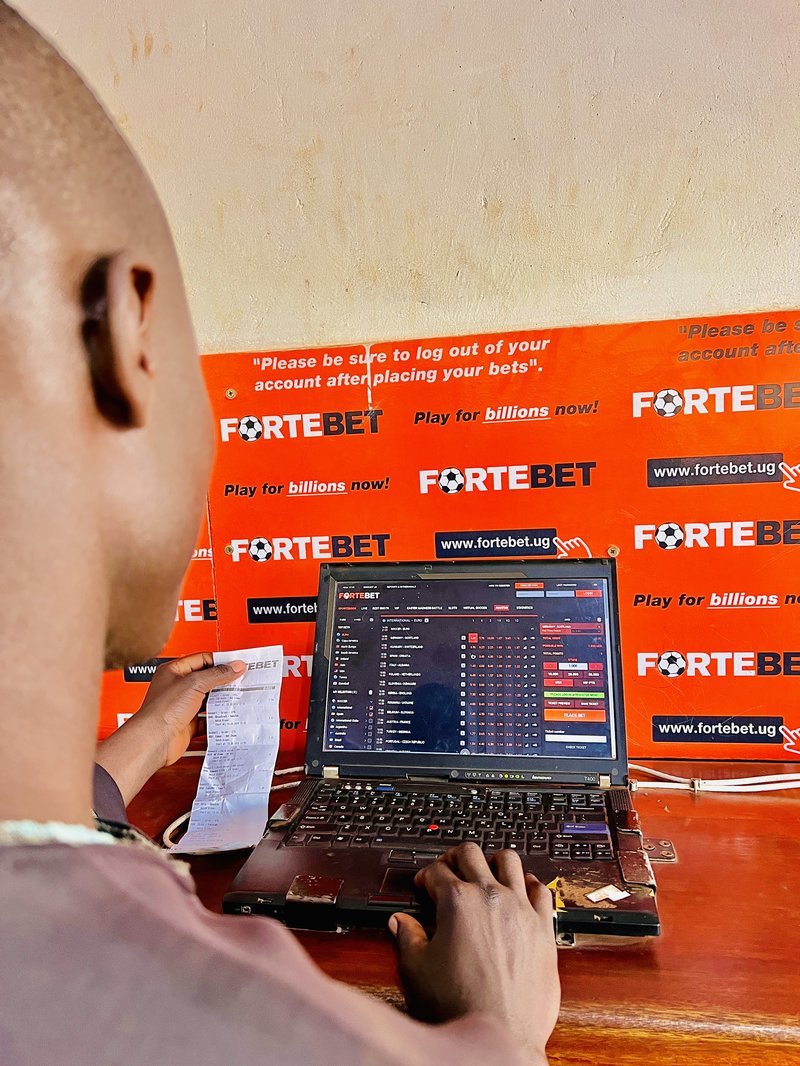
A gamester checks the odds on his football predictions
What is being done
Ms Winnie Kabumbuli, the Dean of Students at Makerere University acknowledges that the university administration is concerned about the dropping out of students due to betting. She states that the administration is committed to supporting the students’ success and well-being. It hopes to increase awareness about the dangers of betting, provide counseling services to students struggling with addiction and support research on the impact of betting on students’ well-being whilst collaborating with stakeholders to develop programmes promoting responsible gambling practices. “We recognize that sports betting has become a significant problem among youth, and we are committed to addressing it. To students who may have fallen victim, I advise seeking help from our counseling services, prioritising your studies and surrounding yourselves with supportive peers and mentors. Remember that your future is more valuable than any temporary gain,” advises Ms Kabumbuli.
Addictions feed into a sudden reward/pleasure, according to Ms Joan Nakirya, a Child and Adolescent Mental Health Specialist. She says that there is a sense of relief one gets when they get more with less. But,an addiction like that of betting comes with many consequences.
“Betting is a distraction to a student and it strains relationships especially when one is borrowing money to engage in it. Betting also makes one prone to any other addictions as they meet and engage with company they are not certain about, often leading to anxiety or depression. At worst, it could come to suicide. Future professional aspirations are also affected. When betting is one’s primary expenditure, they’d rather trade a good meal for a stake, or seek cheaper alternatives to treat ailments. Over time they neglect themselves and get affected physically,” Ms Nakirya says. She advises that students should seek help by talking to someone about it or find a distraction in healthy alternatives like physical sport and changing one’s company if their peer group supports the addiction. “Once they get help, they can get a motivation to refocus their life,” she says.
In 2018, a second-year student (name withheld) on government sponsorship discovered a lifestyle in betting, and unfortunately had his education wrecked. He borrowed from fellow students to feed the vice and did not get much luck at the stakes. He soon started to miss classes for fear of being seen by his debtors and had to leave school for over four years. When his former classmate ran into him five years later, the former admitted to having mismanaged his initial study opportunity and confessed that he luckily managed to reform when he changed his circle of friends from those who did not advise him against betting and other vices, to responsible ones that he looked at as models for a decent and more fulfilling life. He managed to enroll for another course and start university afresh in Kyambogo University.
This student and others like Kyakize’s son have been able to reform and seek healthier ways to make money. It is now known however how many are able to find their way back like they did. What is better is not to start in the first place as one never knows where that path will lead them.
“I encourage students to be contented, “You don’t need to force life, easy come easy go,” cautions Afande Mucunguzi, adding that if betting actually helped one make good money, Kampala landlords would be betting for a living.
Related News
![]() Please join hands with the Makerere University Endowment Fund as it works towards attracting & retaining the best faculty, providing scholarships, and investing in cutting-edge research and technology.
Please join hands with the Makerere University Endowment Fund as it works towards attracting & retaining the best faculty, providing scholarships, and investing in cutting-edge research and technology.
